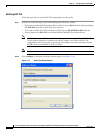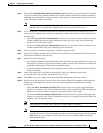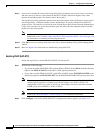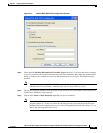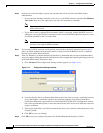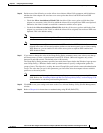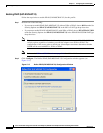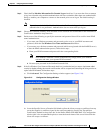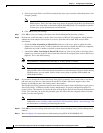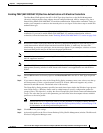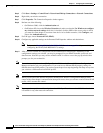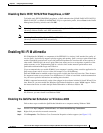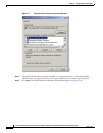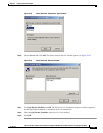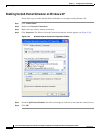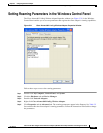
5-48
Cisco Aironet 802.11a/b/g Wireless LAN Client Adapters (CB21AG and PI21AG) Installation and Configuration Guide
OL-4211-03
Chapter 5 Configuring the Client Adapter
Setting Security Parameters
c. If the Login Name field is not filled in automatically, enter your username with nothing after it (for
example, jsmith).
Note Some RADIUS servers require that the same name be entered for both the inner and outer
PEAP tunnels. That is, the same name may need to be entered in both the Login Name field
and the User Name field on the Define PEAP (EAP-MSCHAP V2) Configuration window.
Contact your system administrator for information.
d. Click OK to save your settings.
Step 7 Click OK to save your settings and return to the Profile Management (Security) window.
Step 8 Perform one of the following to set the Allow Association to Mixed Cells parameter, which indicates
whether the client adapter can associate to an access point that allows both WEP and non-WEP
associations:
• Check the Allow Association to Mixed Cells check box if the access point to which the client
adapter is to associate (or the VLAN to which the client will be assigned) has WEP set to Optional.
Otherwise, the client is unable to establish a connection with the access point.
• Uncheck the Allow Association to Mixed Cells check box if the access point to which the client
adapter is to associate (or the VLAN to which the client will be assigned) does not have WEP set to
Optional. This is the default setting.
Note This parameter is available only if the 802.1x security option is selected.
Note For security reasons, Cisco recommends that WEP-enabled and WEP-disabled clients not be
allowed in the same cell because broadcast packets are sent unencrypted, even to clients running
WEP. However, you can enable VLANs on the access point to separate WEP-enabled and
WEP-disabled clients.
Step 9 If you want to change the value of the Group Policy Delay parameter, enter a new value or use the up
and down arrows to select a value between 0 and 65535 seconds. (Microsoft supports only values
between 30 and 600 seconds. The default value is 60 seconds.)
The Group Policy Delay parameter specifies how much time elapses before the Windows logon process
starts Group Policy, a Windows feature used by administrators to specify configuration options for
groups of users. The objective is to delay the start of Group Policy until wireless network authentication
occurs. The value that you set for this parameter goes into effect after the computer reboots with this
profile set as the active profile.
Note A Microsoft hot fix is required in order to use this parameter on computers running Windows
2000. Refer to the “Installing a Microsoft Hot Fix for Group Policy Delay” section on page 3-20
for information on obtaining and installing the hot fix.
Step 10 Click OK to save your settings and return to the Cisco Aironet Desktop Utility (Profile Management)
window.
Step 11 Refer to Chapter 6 for instructions on authenticating using PEAP (EAP-MSCHAP V2).



